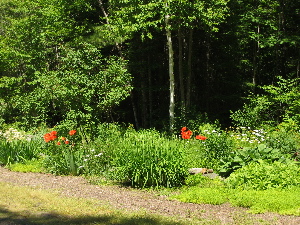DID YOU SAY "RUBBER" MULCH?
I'm sorry...mulch to me is organic matter derived from once living vegetable matter! It's "Black Gold". A very good name for this most wonderful garden amendment material. But, "RUBBER" mulch?
I saw an advertisement for it in a gardening web-site. I went to the link offered and saw that it is used for playgrounds and horseback riding arenas as well as gardens. Now I can understand the playground, and the arena for horses, but GARDENS??? I don't think so.
Sure, it'll hold down the weeds. But...
The very BEST part about mulch, in my way of thinking is that it enriches the soil. It is the best amendment for your soil as it gradually breaks down and works it's way into the soil. It encourages worms and critters that are so good for the plants. It will help keep the plants it surrounds healthy. It grabs moisture and holds onto it. It blocks weeds. It is a cooling element in the summer, and it will keep your plant roots warm in the fall and early spring.
Forget RUBBER! Think organic...think compost...think like a true gardener!
(The crazy thing about this posting is that you will probably see an advertisement for Rubber Mulch over on the right side of my web site. That's because the browser "spider" will pick up those words and automatically display advertisements for Rubber Mulch. PLEASE, know I did NOT ask for that! My words of advice? Do not use Rubber Mulch!)




